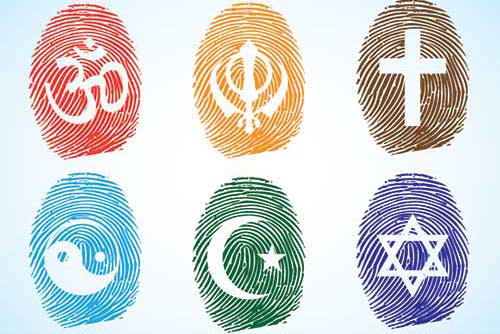Advice For Interfaith Marriage
by Ayesha Jain, 16 June 2013Recently I wrote an article on how to convince your parents to accept your inter-caste marriage. Since then I have received many questions from people who would like to know if there are any additional challenges that are specific to inter-religion or inter-faith marriages. This is a great question that will be the subject of today's article.

To begin with, let's take a quick look at religion itself. Unlike caste, which in my opinion is little more than glorified social branding, religion is a way of life. Religion affects almost every decision in your life, from the clothes you wear to the food you eat. Immediately you can see that compared to a inter-caste marriage, the challenges of a inter-faith marriage are much more complex.
Below are what I believe are the 3 main challenges you will face in a inter-religion marriage:
#1 - Children
Perhaps the biggest challenge within an inter-faith marriage is the need to come to an agreement regarding which religious beliefs and values will be passed down to your children. Depending on how strong you or your partner's faith is, finding a compromise may be difficult. For example, if you are Hindu and your partner is Christian, will you accept your children being baptised?
#2 - Family and Social Challenges
How supportive will your family be of the marriage? Will your family at least respect your partner's religious beliefs? If your family is not supportive of the marriage and does not agree with your partners way of life, this will apply significant pressure and stress to the relationship.
Just like in a inter-caste marriage, you will also face some social challenges. The most difficult may come from your place of worship. If you are married to someone following an opposing religion, will you still be accepted by your church, mosque or temple? Will you be able to find a holy person to conduct the ceremony?
Performing community work where you can help people of your partner's faith maybe a good way to show your respect for the other religion. For example, if your partner is Christian, you may perform community or charity work where you can help Christians who are in need.
#3 - Tolerance and Acceptance
Being tolerant of each others beliefs is important if the marriage is going to be successful. There will be times that your partners beliefs will be in direct conflict with your own. You and your partner must accept each others differences and not attempt to persuade each other to change their faith. If you are a Muslim man, will you expect your Christian wife to wear a hijab and to follow Islamic law? If so, it maybe a good idea not to proceed with the marriage. If you are Christian and your partner is Hindu, you need to be tolerant of idols being worshipped within the house.
An inter-faith marriage is not one that should be rushed into. Prior to the marriage you must discuss all the potential challenges with your partner. Critically, you must come to an agreement on how you will face the 3 main challenges I have listed above. If you are able to manage these challenges, an inter-religious marriage can be very fulfilling and may even lead to increased spiritual enlightenment.



